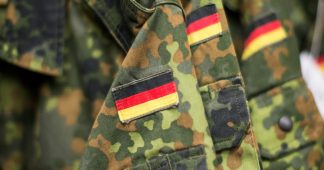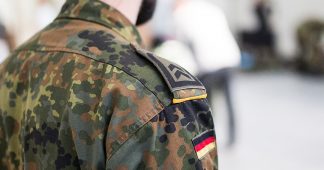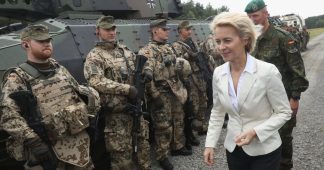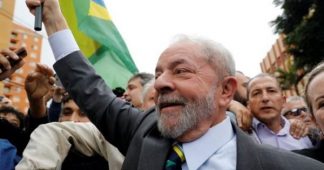By Sven Heymann
4 July 2018
The Frankfurt am Main Higher Regional Court (OLG) announced June 7 that the right-wing army officer Franco A. would not be charged with the preparation of a serious criminal offence.
The court justified its decision by arguing there was “insufficient suspicion” in this regard. Other charges, including violations of the weapons law and fraud, are to be heard in a trial before the Darmstadt Regional Court. The Federal Prosecutor’s Office has since lodged a complaint against the OLG decision.
In view of the accusations made by the Prosecutor’s Office against Franco A., the decision of the OLG is a scandal. The case caused an outcry last year. On February 3, 2017, Franco A. was arrested at Vienna Airport as he sought to pick up a firearm hidden there in a toilet cubicle. In the subsequent investigation, it became known that Franco A., together with at least two other accomplices, Maximilian T. and Mathias F., had apparently planned attacks on high-ranking politicians and personalities. Franco A. had registered in Bavaria as a Syrian refugee, received subsidiary protection status and apparently planned to blame future deeds on refugees to incite right-wing and xenophobic sentiment in Germany.
Maximilian T., who had served in the Bundeswehr (Armed Forces) in the same unit as Franco A., in Illkirch in France, had apparently covered up for him with their superiors. Maximilian T. is now working as a personal spokesperson for the far-right Alternative for Germany (AfD) member of the Bundestag (parliament) Jan Nolte, who was also previously a soldier. Franco A. himself had already come to notice during his studies with the Bundeswehr for a Master’s thesis which, according to the scientific director at the Centre for Military History and Social Sciences of the Bundeswehr, presented “a radical nationalist, racist appeal.” Following an oral warning, Franco A. was nevertheless able to continue his studies undisturbed.
A list said to be drawn up by Maximillian T. included the names of the former Federal President Joachim Gauck, the then Justice and current Foreign Minister Heiko Maas (Social Democratic Party, SPD), the Green Party politician Claudia Roth and the Left Party state premier of Thuringia, Bodo Ramelow. Bodies such as the radical artist collective Centre for Political Beauty, the Central Council of Muslims and the Central Council of Jews in Germany were also listed. These were thought to have been possible targets for attacks. In addition, the three suspects were found to possess extensive stocks of weapons and ammunition.
The Frankfurt Higher Regional Court did (or could) not fundamentally deny that Franco A. prepared such attacks. As the court wrote in a press release, it was “mostly likely that the accused acquired the two pistols and the two rifles and 51 explosives and kept them.” It was “however, not predominantly likely that he had already taken the firm decision to commit a serious violent offence.”
The court then immediately undercut this claim. It declared that “several circumstances speak in favour of a firm decision on the part of the defendant.” “Some,” the court continued, “even suggest that he had already concretized this act in terms of crime scene, means and victim.” As evidence, the court argued that Franco A. “had a nationalist/ völkisch and anti-Semitic attitude, on the basis of which he rejected the political system of the Federal Republic of Germany.” The officer had “wanted to undertake a politically effective action to influence the conditions in Germany in accordance with his ideas.”
The court also recognized how far-reaching Franco A’s terrorist plans were. The defendant had also “seriously considered the use of force, including the killing of a high-ranking politician and/or a public figure or a human rights activist,” according to the OLG. As evidence, the Higher Regional Court stated that Franco A. had “penetrated the private underground car park of the building” on June 22, 2016, in which the named activist was working, photographing “vehicles parked there with his mobile phone.” In addition, he had procured “accessories for the firearms and subsequently fired two of these weapons at a shooting range.”
But anyone believing that such serious suspicions must inevitably lead to a charge of the preparation of a serious violent offence is deceiving themselves. In order to abandon this charge, the Higher Regional Court employed a fantastical line of argument.
In the eyes of the court, the lack of Franco A’s determination to commit a terrorist attack is precisely because he did not commit this crime, even though he had already undertaken all the necessary preparatory measures. Because neither before his arrest at the airport in Vienna nor between his release on February 4 and his renewed arrest on April 26, 2017, had he carried out a serious violent offence, the court argued. “This, despite the fact that he possessed weapons and explosives since the end of July 2016, concretised possible victims and spied on a possible crime scene with the underground car park. Since there were no circumstances which objectively, or at least in his view, prevented the accused from committing the crime, it was highly probable that the defendant was not yet determined as to the circumstances relevant to him for committing the crime,” the OLG press release states.
This argument is not only outrageous but also demonstrably false. Franco A. was by no means idle in the period between July 2016 and his arrest. On the contrary: picking up the previously hidden pistol at Vienna’s airport led to his arrest on February 3, 2017. The gun is supposed to have been deposited there on January 22, as the OLG itself writes, in other words, just two weeks before his arrest.
Even the statement that Franco A. had not committed an attack between his release and his renewed arrest on April 26, 2017, means the Higher Regional Court is saying more than it admits. After all, why was Franco A. arrested again in April after being released in January and being held for just one day? In the meantime, the right-wing extremist background of Franco A. and his cover identity as a Syrian refugee were exposed. Subsequently, Franco A. spent more than seven months in custody on suspicion he posed a specific danger. He was then released in November 2017.
All the evidence in the case indicates that Franco A. and his accomplices are only a small part of a much larger neo-Nazi network within the Bundeswehr and the German state apparatus. It has since become known that there is a close connection between the case of Franco A. and the planned assassination of left-wing politicians in Mecklenburg Pomerania. In both cases, the suspects were members of a chat network of so-called prepper groups, preparing for apocalyptic scenarios such as civil wars. According to the taz newspaper, the administrator of these chats is a man who calls himself “Hannibal” and functions as an active soldier in the Kommando Sonderkräfte (KSK), an elite special forces unit of the German military.
The decision of the OLG Frankfurt must be understood as a serious warning. While government agencies are doing everything to minimize and cover up right-wing extremist and even terrorist activities of soldiers, police and agents, as in the case of the neo-Nazi National Socialist Underground (NSU), left-wing protest is punishable with long prison sentences, such as the G20 summit in Hamburg, even if there is no evidence.
The newly created state police laws, especially in Bavaria, are paving the way for the criminalization of political opposition. As in the period of the Weimar Republic, the return of Germany to Great Power politics and militarism can only be enforced today by stifling resistance as far as possible and by encouraging, building and supporting the most right-wing forces.











